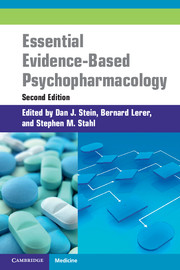Book contents
- Essential Evidence-Based Psychopharmacology
- Essential Evidence-Based Psychopharmacology
- Copyright page
- Contents
- Contributors
- Preface
- 1 Evidence-based pharmacotherapy of attention deficit hyperactivity disorder
- 2 Evidence-based pharmacotherapy of schizophrenia
- 3 Evidence-based pharmacotherapy of bipolar disorder
- 4 Evidence-based pharmacotherapy of major depressive disorder
- 5 Evidence-based pharmacotherapy of panic disorder
- 6 Evidence-based pharmacotherapy of social anxiety disorder
- 7 Evidence-based pharmacotherapy of generalized anxiety disorder
- 8 Evidence-based pharmacotherapy of obsessive–compulsive disorder
- 9 Evidence-based pharmacotherapy of post-traumatic stress disorder
- 10 Evidence-based pharmacotherapy of eating disorders
- 11 Evidence-based pharmacotherapy of nicotine and alcohol dependence
- 12 Evidence-based pharmacotherapy of illicit substance use disorders
- 13 Evidence-based pharmacotherapy of Alzheimer's disease
- 14 Evidence-based pharmacotherapy of personality disorders
- Index
10 - Evidence-based pharmacotherapy of eating disorders
Published online by Cambridge University Press: 05 August 2012
- Essential Evidence-Based Psychopharmacology
- Essential Evidence-Based Psychopharmacology
- Copyright page
- Contents
- Contributors
- Preface
- 1 Evidence-based pharmacotherapy of attention deficit hyperactivity disorder
- 2 Evidence-based pharmacotherapy of schizophrenia
- 3 Evidence-based pharmacotherapy of bipolar disorder
- 4 Evidence-based pharmacotherapy of major depressive disorder
- 5 Evidence-based pharmacotherapy of panic disorder
- 6 Evidence-based pharmacotherapy of social anxiety disorder
- 7 Evidence-based pharmacotherapy of generalized anxiety disorder
- 8 Evidence-based pharmacotherapy of obsessive–compulsive disorder
- 9 Evidence-based pharmacotherapy of post-traumatic stress disorder
- 10 Evidence-based pharmacotherapy of eating disorders
- 11 Evidence-based pharmacotherapy of nicotine and alcohol dependence
- 12 Evidence-based pharmacotherapy of illicit substance use disorders
- 13 Evidence-based pharmacotherapy of Alzheimer's disease
- 14 Evidence-based pharmacotherapy of personality disorders
- Index
Summary
Keywords
- Type
- Chapter
- Information
- Essential Evidence-Based Psychopharmacology , pp. 190 - 213Publisher: Cambridge University PressPrint publication year: 2012

